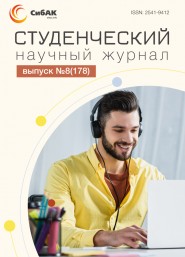Статья опубликована в рамках: Научного журнала «Студенческий» № 8(178)
Рубрика журнала: Педагогика
Скачать книгу(-и): скачать журнал часть 1, скачать журнал часть 2, скачать журнал часть 3, скачать журнал часть 4
THE DEVELOPMENT OF M. MONTESSORI'S IDEAS IN THE MODERN EDUCATIONAL PROCESS
РАЗВИТИЕ ИДЕЙ М. МОНТЕССОРИ В СОВРЕМЕННОМ ОБРАЗОВАТЕЛЬНОМ ПРОЦЕССЕ
Дроботушенко Анна Руслановна
студент, кафедра русского языка и русской литературы, Белгородский государственный национальный исследовательский университет (НИУ «БелГУ»),
РФ, г. Белгород
ABSTRACT
Maria Montessori created a system of scientific pedagogy, made it possible to implement a new principle of freedom of the student, which contribute to the identification of individuality in the child and give the opportunity to pay attention to personal preferences. Kindergartens and schools that operate under its system have already taken a prominent place. The method has withstood criticism from all sides since the publication of M. Montessori's first book, and is gaining more and more supporters.
АННОТАЦИЯ
Мария Монтессори создала систему научной педагогики, позволила реализовать новый принцип свободы ученика, которые способствуют выявлению индивидуальности у ребенка и дают возможность уделять внимание личным предпочтениям. Детские сады и школы, которые работают по ее системе, уже заняли заметное место. Метод выдержал критику, обрушившуюся на него со всех сторон с момента публикации первой книги М. Монтессори, и приобретает все больших сторонников.
Keywords: pedagogy, child development, Russian education.
Ключевые слова: педагогика, детское развитие, российское образование.
The merits of Maria Montessori are recognized all over the world. In some countries of the world, the Montessori system found state support. The government allocated funds, a special building was built, where educational centers began to function. That is why today in the UK Montessori schools make up about 20% of all schools for children 4-12 years old, in Holland - 40%, and in the USA national Montessori societies unite 10 thousand schools and lyceums for children from 4 to 12 years old.
There are only 10-15 schools operating in Russia, but these are mostly private or even family, very chamber schools. The Ministry of Education is not ready for such risky experiments as classes of different ages and the lack of a fixed hourly workload.
There are courses where teachers are taught to work using this technique. For example, at the courses of the Association of Montessori Teachers of Russia, you can fully master the method in six weeks. Seven blocks of the program, the volume of which is 230 academic hours, can be completed at once or in parts. Having passed six tests based on the results of training, you will receive a state-issued certificate, and the courses are conducted jointly with the Academy of Advanced Training. It is not necessary to have a pedagogical education. The courses are organized five times a year, and there are quite a lot of people who want to study at them.
The Association of Montessori Teachers of Russia is convinced that this area of pedagogy has a great future in our country. In a Montessori school, a child gets used to living in an atmosphere of constant creative work and the search for independent solutions to their problems. And this means that the child grows up free and independent.
To date, the introduction of the Montessori educational method in Russia continues.
As the chairman of the All-Russian Professional Union "Association of Montessori Teachers of Russia" Larisa Klimanova said, in our country this method of teaching exists mainly in primary and preschool education.
At the moment, there are about 50 groups in kindergartens in Moscow, trained by the Montessori method (private and public sector). In state institutions, this type of teaching is used only as a methodology.
The basic principle of the Montessori method is that children develop a certain algorithm for acquiring information that they learn to receive independently. Students of different ages are gathered in one group. At the same time, everyone has the opportunity to work at their own pace: the time spent on studying something can be anything.
The use of M.Montessori's methodology in the upbringing of children obliges the educator to complex methodological and material training. Although in most cases simple household items are used for classes, the preparation of the material base should be done purposefully and for a fairly long period of time. There should be a lot of materials, because this is the key moment in the very process of classes. All benefits are available for children, open, which in itself already has a certain function. The methodology implies the child's independent choice of the field of study, and not the imposition by the educator of the same type and template tasks that are the same for all children. The child fully realizes his right to choose and independently decides what, when and for how long to do. If there is a large selection of tasks, it is obvious that each of the children will be able to choose a suitable activity for themselves, and next time they will turn their attention to what they have not done yet.
Independence in the choice of classes and the way of solving the tasks assigned to the child does not speak at all about permissiveness, because along with these qualities, discipline is instilled, the obligation to keep your workplace in order, clean and independently remove the material after the end of classes to the place.
There is a prospect of making this method legal in our country, but many educators and education experts do not agree that it should be widely used in traditional schools.
References:
- Dichkovskaya I.N., Ponimanskaya T.I. Education for life: the educational system of Montessori. - M., 1996.
- Montessori M.. Help me do it myself. - M. 2000
- Pedagogy of M. Montessori: A course of lectures. - Part 1-2. - M., 1992-93.
- Sumnitelny K.E. How to help a child build himself? (Conversations about Montessori pedagogy). - M., 1999.


Оставить комментарий